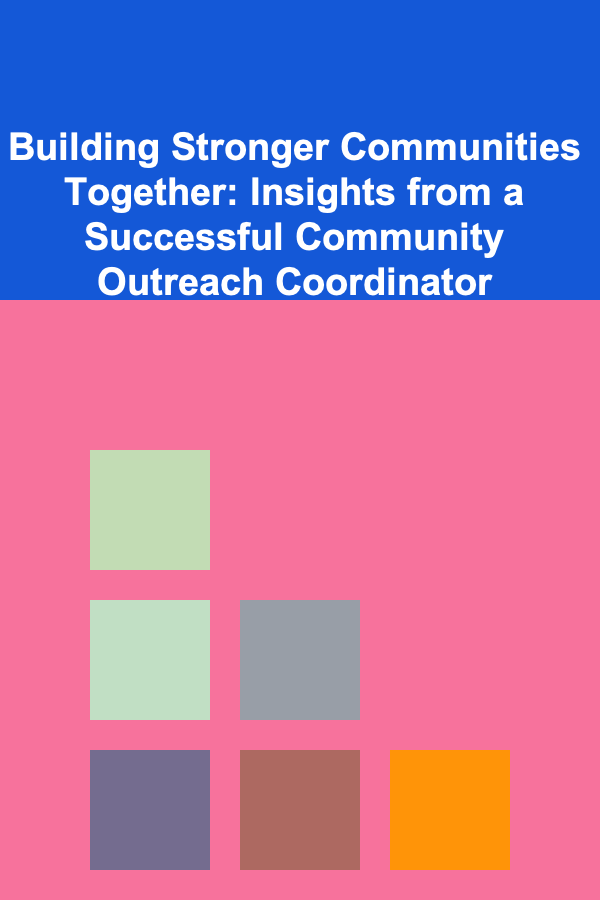
Building Stronger Communities Together: Insights from a Successful Community Outreach Coordinator
ebook include PDF & Audio bundle (Micro Guide)
$12.99$6.99
Limited Time Offer! Order within the next:

Community outreach is a vital part of the social fabric that ties people together, supports their growth, and enables them to thrive. A successful community outreach coordinator plays a pivotal role in fostering strong, resilient, and engaged communities. From building trust to facilitating dialogue, outreach coordinators serve as the bridge between organizations and the people they aim to serve. Drawing from the experience of those who have worked at the heart of community outreach, this guide provides actionable insights into building stronger communities through effective outreach strategies.
The Role of a Community Outreach Coordinator
A community outreach coordinator acts as a liaison, connecting resources, organizations, and local populations. They develop and implement outreach strategies, mobilize volunteers, create educational programs, and act as an advocate for underrepresented groups. Their job isn't just about executing a series of events; it's about creating sustainable change, fostering a sense of belonging, and addressing both the immediate and long-term needs of the community.
Key Skills of a Successful Outreach Coordinator
To build stronger communities, an outreach coordinator must possess a diverse set of skills and a mindset geared toward empathy, adaptability, and leadership. Below are essential skills:
- Communication: The ability to clearly articulate messages, actively listen, and foster dialogue is critical. Whether communicating through social media, at community meetings, or one-on-one with individuals, effective communication is foundational.
- Cultural Competence: Successful outreach coordinators must be culturally aware and sensitive to the diverse needs and backgrounds of the communities they serve. Understanding cultural nuances is essential for building trust and addressing the community's unique challenges.
- Problem Solving: A coordinator should be skilled in analyzing problems, developing creative solutions, and mobilizing resources. From resolving logistical issues to tackling systemic challenges, problem-solving is at the core of outreach work.
- Project Management: From planning events to coordinating resources, outreach coordinators must be able to manage multiple tasks and deadlines effectively. Organizational skills and attention to detail are key in ensuring successful program delivery.
- Relationship Building: Cultivating and maintaining relationships with community members, local businesses, governmental bodies, and organizations is essential. A successful outreach program is built on a network of strong, trusting relationships.
Building Trust: The Foundation of Effective Outreach
Before a successful community outreach program can take off, trust must be established. Without trust, community members will not engage or participate in the outreach efforts. Trust is a long-term investment; it requires consistent effort and authenticity. Here's how outreach coordinators can build trust:
1. Engage Early and Often
The first step in building trust is to engage with the community early and frequently. Outreach efforts shouldn't begin only when a problem arises or when a program is about to launch. Community coordinators should consistently check in with residents, leaders, and organizations to hear about their needs, experiences, and feedback.
Regular engagement shows that the coordinator is genuinely invested in the community's well-being and isn't just there to check off tasks. It also provides an ongoing opportunity to learn about the community's evolving needs, ensuring that outreach remains relevant and effective.
2. Be Transparent and Honest
Trust is built on transparency and honesty. Outreach coordinators must be clear about their goals, processes, and the impact of their work. This means being open about challenges, limitations, and successes. If things don't go as planned, it's important to acknowledge the issue and share how it will be addressed moving forward. Community members appreciate honesty, as it demonstrates accountability.
3. Lead with Empathy
Effective community outreach is rooted in empathy. Outreach coordinators must genuinely care about the people they serve. Leading with empathy means listening to people's concerns, validating their experiences, and offering support where it's needed most. Outreach coordinators should aim to understand individuals' perspectives, be responsive to their needs, and act with compassion in every interaction.
4. Honor Cultural and Social Dynamics
Communities are diverse, and each community has its unique social, cultural, and historical dynamics. Successful outreach coordinators understand that building trust requires respecting these differences. By acknowledging and celebrating cultural nuances, coordinators foster inclusivity and create spaces where everyone feels welcome.
Crafting a Strategic Outreach Plan
Building stronger communities through outreach requires careful planning. A strategic outreach plan guides the entire process, ensuring that every action taken is purposeful and aligned with the community's needs.
1. Define Clear, Measurable Goals
Outreach efforts should have a clear vision of what success looks like. Goals should be specific, measurable, and time-bound. For instance, if the goal is to increase access to healthcare services, measurable goals might include a target number of individuals to be reached through informational campaigns or a goal to provide free health screenings to a certain number of people within a specified timeframe.
2. Identify Community Stakeholders and Partnerships
Successful outreach is rarely done in isolation. It requires the collaboration of various stakeholders. Identify key community leaders, organizations, and businesses that can serve as allies in your outreach efforts. These partners can offer resources, logistical support, or credibility, all of which enhance the effectiveness of your outreach programs.
Strategic partnerships also help to ensure that outreach efforts are sustainable. For instance, local schools, churches, or youth organizations may be interested in co-hosting events or offering space for outreach activities.
3. Leverage Technology to Expand Reach
In today's digital age, technology plays a crucial role in community outreach. Social media platforms, websites, email lists, and community apps provide valuable tools for outreach coordinators to connect with a broader audience. By using technology, coordinators can engage with community members before, during, and after events, ensuring that the community is kept informed and involved.
However, technology should be used thoughtfully. It's essential to ensure that digital tools are accessible to all community members, particularly for those who may have limited internet access or are not tech-savvy.
4. Design Inclusive and Accessible Programs
Inclusion is key to building stronger communities. Outreach programs should be designed to meet the diverse needs of all community members, regardless of age, gender, race, or socioeconomic status. This might involve offering programs in multiple languages, providing accommodations for individuals with disabilities, or ensuring that events are held at times and locations that are convenient for a wide range of people.
Programs should also be flexible, allowing for participation in different ways. For instance, a health awareness campaign could include workshops, digital content, and community discussions to engage individuals with varying levels of interest and availability.
Measuring the Impact of Outreach Programs
An effective community outreach coordinator consistently evaluates the impact of their programs to ensure they are achieving their goals and meeting the community's needs. Measuring success is essential not just for accountability, but also for identifying areas of improvement.
1. Gather Feedback from Participants
Feedback is an invaluable tool in evaluating outreach efforts. After an event or program, ask participants for their thoughts on what worked, what didn't, and what could be improved. This can be done through surveys, focus groups, or informal conversations. Ensuring that feedback is collected from a diverse group of participants ensures a more comprehensive understanding of the program's impact.
2. Track Quantitative Data
In addition to qualitative feedback, tracking quantitative data such as attendance, participation rates, or the number of resources distributed is crucial. These metrics provide concrete evidence of how far the outreach efforts have reached and whether they are making a measurable difference.
3. Adjust Based on Findings
Community outreach is an iterative process. By continuously measuring and reflecting on the outcomes of outreach programs, coordinators can make necessary adjustments to improve their impact. If a particular strategy isn't working, or if community needs have shifted, being open to change and improvement is essential for long-term success.
Conclusion: The Power of Collaboration and Consistency
Building stronger communities through outreach is a process that requires time, effort, and collaboration. By establishing trust, being culturally aware, crafting strategic plans, and evaluating outcomes, community outreach coordinators can foster environments where everyone feels valued, supported, and empowered. The power of community outreach lies in its ability to unite people, bridge gaps, and create lasting social change. A successful outreach program is not just about addressing immediate needs---it's about creating a framework for sustained, collective growth.
As we continue to strengthen communities, outreach coordinators must stay dedicated to their mission of empowering individuals, advocating for their needs, and facilitating lasting, positive change. By working together, we can build stronger, more resilient communities that stand the test of time.
Reading More From Our Other Websites
- [Hiking with Kids Tip 101] Kid-Safe Hiking Trails and Their Interactive Maps
- [Home Budget 101] How to Make Extra Income to Boost Your Home Budget
- [Home Budget Decorating 101] How to Give Old Furniture a New Life: Inspiring Ideas for Repurposing Household Items into Statement Pieces
- [Home Party Planning 101] How to Plan the Ultimate Surprise Birthday Party at Home
- [Home Pet Care 101] How to Safely Store Pet Medications at Home
- [Home Maintenance 101] How to Maintain Your Home's Water Heater for Efficiency and Longevity
- [Small Business 101] How to Create a Subscription Box Model That Works for Handmade Crafts
- [Home Maintenance 101] How to Use Your Air Fryer for Healthy Cooking
- [Organization Tip 101] How to Maintain an Organized Office Supply Closet
- [Rock Climbing Tip 101] Essential Gear Checklist: Staying Safe on Every Climb

How to Install Accent Lighting for a Unique Home Look
Read More
How to Make Your Own Pet-safe Cleaning Products for Your Home
Read More
How to Prepare Quick & Healthy Weeknight Pastas
Read More
How to Use Robo-Advisors to Simplify Your Investment Strategy
Read More
Why You Need a Plan for Managing Seasonal Clothing Swaps
Read MoreHow to Use a Kanban Board as a Task Tracker
Read MoreOther Products

How to Install Accent Lighting for a Unique Home Look
Read More
How to Make Your Own Pet-safe Cleaning Products for Your Home
Read More
How to Prepare Quick & Healthy Weeknight Pastas
Read More
How to Use Robo-Advisors to Simplify Your Investment Strategy
Read More